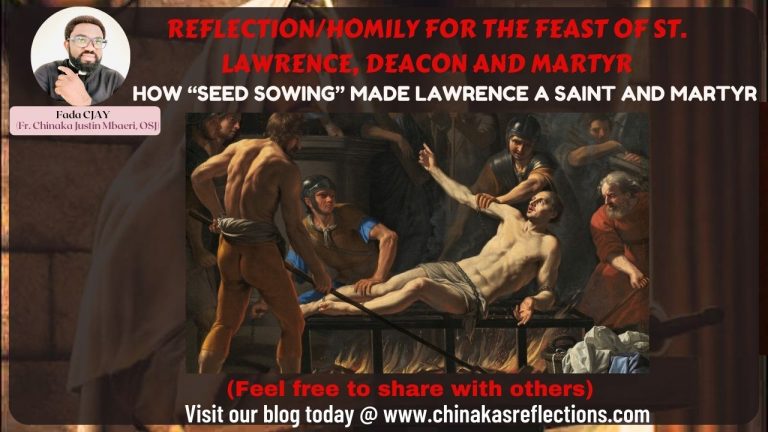HOW “SEED SOWING” MADE LAWRENCE A SAINT AND MARTYR
First Reading: 2 Corinthians 9:6-10
Responsorial Psalm: Ps. 111(112):1-2,5-9
Gospel Reading: John 12:24-26
__________________________________________
Regrettably, the concept of “seed sowing” has undergone significant misinterpretation in contemporary Christianity. Mention of this phrase often erupts thoughts of obligatory donations to religious leaders who already have more than enough. Today, the Church commemorates St. Lawrence, who serves as an embodiment of the genuine essence of “seed sowing.” Through his cheerful and abundant giving, he imparts strong lessons about the authentic beneficiaries of this practice, ultimately leading to his martyrdom and sainthood. The liturgical readings for today intricately illuminate the essence of this truth.
In the first reading, the origins of the popular adage “God loves a cheerful giver” in the context of “seed sowing” emerge. This pertains to Paul’s address to the early Corinthian Church, arising from the imperative of generosity. It’s crucial to note that at this juncture, the Church members shared communal resources; a community wherein both affluent and impoverished coexisted. When it got to the point where the poor were almost becoming a burden to the rich, Paul had to address them, encouraging generosity. Here, Paul was not asking the rich to give or to sow seeds into the life of the leaders/ministers of the Church, but to share among those who do not have enough (the needy, poor, less privileged, etc.); little wonder he said in verse 12 that “for the help provided by this contribution not only satisfies the needs of ‘God’s holy people’, but also overflows into a widespread thanksgiving to God.” In all these, Paul says in verse 7, that one must give according to his own initiative, and not under compulsion; not a fixed amount.
St. Lawrence, the focal point of today’s celebration, can be seen as someone who lived out the gospel principles highlighted by St. Paul. A notable second-century Roman martyr, Lawrence was among seven deacons entrusted with supporting the poor and needy—effectively “sowing” into their lives. Amid the Church’s persecution, Pope St. Sixtus II became a target. When the Pope was taken away for execution, Lawrence, his deacon, followed, tearfully questioning the Pope’s departure without his deacon. The Pope reassured Lawrence, predicting that he would follow in three days. Filled with joy, Lawrence gathered the indigent and disbursed Church funds entrusted to him, even liquidating valuable Church assets to increase his charitable offerings. Lawrence’s conduct resounds the words of today’s Psalmist: “The good man takes pity and lends, he conducts his affairs with honour… The just man will never waver: he will be remembered forever… Open-handed, he gives to the poor; his justice stands firm forever. His head will be raised in glory.” Due to his altruistic conduct, the Rome prefect, presuming the Church held hidden wealth, demanded that Lawrence revealed the treasure. In response, Lawrence went through the city and gathered together all the poor and sick people supported by the Church and showed them to the prefect and said: “These people are the Church’s treasure.” In his furiousness and anger, the prefect asked them to kill Lawrence slowly so he would suffer more. He was tied on top of an iron grill over a slow fire that roasted him. God gave him so much strength and joy that Lawrence joked with the judge saying “Turn me over, this side has roasted properly.” Before he died, he prayed that the city of Rome might be converted to Christ and that the Catholic faith would spread all over the world.
The martyrdom (death) of St. Lawrence is indeed a seed of the Church, sown into the lives of the poor in order to yield a rich harvest. Just as today’s gospel reading puts it: “unless a wheat grain falls on the ground and dies, it remains only a single grain; but if it dies, it yields a rich harvest.” As such, we can talk of him as one ‘who hated his life in this world and kept it for eternal life,’ as Christ also says in today’s gospel reading.
Dear friends in Christ, diverse forms of human impoverishment exist—spiritual, material, cultural, moral, and more. However, charity can surmount any of these challenges. Like Lawrence, our duty lies in “sowing” into the lives of those in need, rather than adhering to the prosperity gospel’s teachings, which often demand substantial donations for promised riches. The authentic notion of seed sowing bears no relation to monetary submission to “pastors” or “Church ministers” for personal gain. Let us aspire to emulate St. Lawrence, whose legacy remains a shining example of charity, compassion for the underprivileged, and a willingness to lay down our lives for the sake of love. Amen.
(CLICK HERE FOR THE NEXT DAY’S REFLECTION: REFLECTION/HOMILY FOR SAINT CLARE, VIRGIN)
Shalom!
© Fr. Chinaka Justin Mbaeri, OSJ
Paroquia Nossa Senhora de Loreto, Vila Medeiros, São Paulo, Brazil
nozickcjoe@gmail.com / fadacjay@gmail.com
__________________________
Have you prayed your rosary today?



God please give me the grace to always care for those who are in need. Dearest St Lawrence pray for us Amen
God please give me divine favours to reach out to the needy and the vulnerable to the glory of your Name.
Lord give us the grace to care for the needy and the vulnerable in our society. Amen.
Amen
Amen